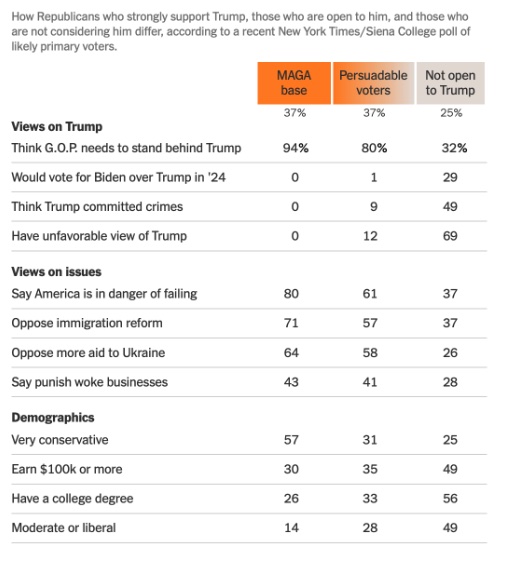A common theme around here is the interconnectedness of elections: that what happens in one party’s primary affects the way voters on the other side are making their decisions.
For example, President Joe Biden’s campaign is spending a lot of time and effort to point out policy successes and other achievements that would make unenthusiastic Democrats feel better about renominating him. But Biden’s greatest asset in reaching the Chicago convention a year from now without incident is something Republican voters are doing: rallying behind former President Donald Trump.
Without the apparent likelihood of Trump being on the ballot next November, Democrats would undoubtedly feel freer to explore alternatives to their incumbent. Whether Trump would actually be the strongest challenger to Biden (he probably wouldn’t be), Democrats fear a Trump return so deeply that they are unlikely to take any chances on an internal fight.
The same works in reverse. How would the plurality of persuadable primary voters on the Republican side feel about their choices if Biden were not running and Democrats had a messy open primary? Trump has won the presidency once and, in the minds of most of his supporters, a second time. As we’ve discussed before, that false belief makes Republicans see Trump as the strongest candidate to take on the Democratic incumbent. What might they think if Vice President Kamala Harris were leading a congested field of aspiring Democrats?
Trump helps Biden and Biden helps Trump.
But there’s a similar vertical effect on political decision-making between offices that functions like the lateral one that works between the parties.
You have to go back to at least 2014 to find a Senate map as lopsided as the one for 2024. A decade ago, the bill was coming due for the Democrats’ great success in the 2008 election. The Obama demi-landslide swept a number of red-state Democrats into office or kept vulnerable incumbents there. When their terms were up six years later, the blue team came in for a thrashing that saw Republicans pick up a total of nine seats from red states—Alaska, South Dakota, West Virginia, Arkansas, and Louisiana—and in competitive states—Colorado, Iowa, and North Carolina.
The Democratic map for 2024, populated by the beneficiaries of the 2012 Obama reelection win, could be almost as bad.
Of the 10 seats that at this point seem likely to be at least somewhat competitive—Arizona, Florida, Michigan, Montana, Nevada, Ohio, Pennsylvania, Texas, West Virginia, and Wisconsin—only two are held by Republicans and half are states Trump won in 2020.
The five of those seats that look to be the most competitive—Arizona, Michigan, Montana, Nevada, and Ohio—all have the Democrats on defense. And one seat, West Virginia, already looks like a loss for the party in power.
And the loss of just one seat would be enough to push the Senate to a tie and give the deciding vote to whomever wins the vice presidency in 2024. If Democrats lose two seats, they lose the Senate in any scenario. But there’s more than the selection of the vice president to make presidential-year Senate contests different from midterm years like 2014.
Of the ways in which the offices of president and senator are vertically connected, it is the powerful, tractor-beam-like correlation between a state’s vote for president and for Senate.
In 2020, of the 35 Senate seats up for grabs, only one was taken by the party opposite the one that carried the state on the presidential level. Republican Sen. Susan Collins of Maine won by more than 9 points in a state Trump lost by a similar amount.
If the 10 most competitive states in this cycle voted the same way they did four years prior and there was a similarly tiny amount of ticket splitting, Democrats would be down three seats just based on the way the wind was blowing. Even in a substantially better showing for Biden in his reelection bid than in 2020, Democrats could easily still lose the Senate.
And that is where the other vertical connection between offices comes into play.
Republicans are contemplating now whether it would be worth even trying to deny Trump the nomination. That effort, even if unsuccessful, could alienate the one-third or more of Republican voters who are strong supporters of Trump. And if it were successful, that third of the party might not show up for Senate races without Trump on the ballot.
On the other hand, the quarter of Republicans who are the most vehemently opposed to Trump are likelier voters—they skew wealthier and more educated compared to the MAGA base and turn out more reliably. Even if they vote against Trump for president, Republicans can feel confident that most will revert to the GOP down ballot. That’s what happened in 2020.
The thinking among some Republican strategists goes like this: A nominee other than Trump might have a better chance of winning the presidency, but could imperil hopes of winning back the Senate. Given the depth and rancor of the schism in the party, a presidential win against an incumbent seems like a reach, but losing with Trump might make the Senate easier and at least help deliver divided government in a second Biden term.
Indeed, a lot of folks in the persuadable plurality of Republican presidential primary voters would probably be okay with that outcome: Trump gets his comeback shot, loses, and the party at last moves on, but does so with enough clout in Congress to rein in the Democratic president. And if Trump pulls off an upset, they can burn that bridge when they get to it, and do so with a Republican Senate and probably keep the House.
This may be a lot of wishcasting, though. A Trump alternative might do very well against Biden, getting enough Trumpies out that, with the help of decisive support among independents, gets more than the three most vulnerable Democratic Senate seats in the process. Instead of just Montana, Ohio, and West Virginia, the GOP could get a boost in Arizona, Michigan, Nevada, Pennsylvania, and Wisconsin. A rising tide might lift a lot of boats.
It’s also possible that Trump would do far worse in 2024 than he did in 2020. That might not only protect those vulnerable Democratic incumbents—except for probably in deep, deep red West Virginia—but make life worse for GOPers in Florida and Texas. If a renominated Trump gets truly thrashed in the general election, Democrats could expand their majority from 51 seats to 53 seats.
Given the narrowness of the current GOP House majority, it’s easy to see how a Trump bust could deliver both chambers of Congress and a second term in the White House for Democrats.
So you can see how the presidential election affects the results in the Senate, but also how thinking about the Senate affects the plans of party tastemakers and insiders when it comes to choosing a presidential nominee. Is it better to dump Trump and risk some Senate gains or to stick with the former president even if it means taking a chance on getting an epic beatdown in Congress?
You will find below our first cut at 2024 Senate rankings. Bear in mind that this is the assessment based on very limited information about candidate recruitment and considerable uncertainty about what the general election climate will be like.
There will be, in due time, surprise races in both directions: safe seats that, because of a wacko nominee or climate shift, become competitive and competitive seats, for similar reasons, that fall off the radar.
We will be back soon with detailed assessments of the top races. This is just a place to start, and we look forward to your feedback.
Toss-Up
Arizona: Incumbent: Kyrsten Sinema (first elected 2018); Independent seat (serves in Democratic majority) since 2022; 2020 result: Biden +0.3
Michigan (open seat): Incumbent: Debbie Stabenow (retiring); Democratic seat since 2000; 2020 result: Biden +2.8
Montana: Incumbent: Jon Tester (first elected 2006); Democratic seat since 2006; 2020 result: Trump +16.4
Nevada: Incumbent: Jacky Rosen (first elected 2018); Democratic seat since 2018; 2020 result: Biden +2.4
Ohio: Incumbent: Sherrod Brown (first elected 2006); Democratic seat since 2006; 2020 result: Trump +8.1
Lean Republican
Florida: Incumbent: Rick Scott (first elected 2018); Republican seat since 2018; 2020 result: Trump +3.3
Texas: Incumbent: Ted Cruz (first elected 2012); Republican seat since 1993; 2020 result: Trump +5.6
(Flip) West Virginia: Incumbent: Joe Manchin (special election 2010); Democratic seat since 1958; 2020 result: Trump +38.9
Lean Democratic
Pennsylvania: Incumbent: Bob Casey Jr. (first elected 2006); Democratic seat since 2006; 2020 result: Biden +1.2
Wisconsin: Incumbent: Tammy Baldwin (first elected 2006); Democratic seat since 1957; 2020 result: Biden +0.6
Solid Republican
Indiana (open seat): Incumbent: Mike Braun (first elected 2018, running for governor in 2024); Republican seat since 2018; 2020 result: Trump +16
Missouri: Incumbent: Josh Hawley (first elected 2018); Republican seat since 2018; 2020 result: Trump +15.4
Nebraska: Incumbent: Deb Fischer (first elected 2012); Republican seat since 2012; 2020 result: Trump +19.1
North Dakota: Incumbent: Kevin Cramer (first elected 2018); Republican seat since 2018; 2020 result: Trump +33.3
Tennessee: Incumbent: Marsha Blackburn (first elected 2002); Republican seat since 1994; 2020 result: Trump +23.2
Utah: Incumbent: Mitt Romney (first elected 2018); Republican seat since 1976; 2020 result: Trump +20.5
Wyoming: Incumbent: John Barrasso (appointed 2007, elected 2008); Republican seat since 1976; 2020 result: Trump +43.3
Solid Democratic
California (open seat): Incumbent: Dianne Feinstein (retiring); Democratic seat since 1992; 2020 result: Biden +29.2
Connecticut: Incumbent: Chris Murphy (first elected 2012); Democratic seat since 2012; 2020 result: Biden +20.1
Delaware (open seat): Incumbent: Tom Carper (retiring); Democratic seat since 2000; 2020 result: Biden +18.9
Hawaii: Incumbent: Mazie Hirono (first elected 2012); Democratic seat since 1976; 2020 result: Biden 29.4
Maine: Incumbent: Angus King (first elected 2012); Independent (caucuses with Democrats) seat since 2012; 2020 result: Biden +9.1
Maryland (open seat): Incumbent: Ben Cardin (retiring); Democratic seat since 1976; 2020 result: Biden +33.2
Massachusetts: Incumbents: Elizabeth Warren (first elected 2012); Democratic seat since 2012; 2020 result: Biden +33.5
Minnesota: Incumbent: Amy Klobuchar (first elected 2006); Democratic seat since 2000; 2020 result: Biden +7.1
New Jersey: Incumbent: Bob Menendez (first elected 2006); Democratic seat since 1982; 2020 result: Biden +15.9
New York: Incumbent: Kirsten Gillibrand (special election 2009); Democratic seat since 1976; 2020 result: Biden +23.2
New Mexico: Incumbent: Martin Heinrich (first elected 2012); Democratic seat since 1982; 2020 results: Biden +10.8
Rhode Island: Incumbent: Sheldon Whitehouse (first elected 2006); Democratic seat since 2006; 2020 result: Biden +20.8
Vermont: Incumbent: Bernie Sanders (first elected 2006); Independent (caucuses with Democrats) seat since 2001; 2020 result: Biden +35.4
Virginia: Incumbent: Tim Kaine (first elected 2012); Democratic seat since 2006; 2020 result: Biden +10.1
Washington: Incumbent: Maria Cantwell (first elected 2000); Democratic seat since 2000; 2020 result: Biden +19.2
Holy croakano! We welcome your feedback, so please email us with your tips, corrections, reactions, amplifications, etc. at STIREWALTISMS@THEDISPATCH.COM. If you’d like to be considered for publication, please include your real name and hometown. If you don’t want your comments to be made public, please specify.
STATSHOT
Biden Job Performance
Average approval: 41.6%
Average disapproval: 53.6%
Net score: -12.0 points
Change from one week ago: ↓ 2.6 points
Change from one month ago: ↓ 3.8 points
[Average includes: NPR/PBS/Marist: 41% approve-52% disapprove; NYT/Siena; 39% approve-54% disapprove; Newsnation: 47% approve-54% disapprove; Gallup: 41% approve-55% disapprove; Quinnipiac: 40% approve-53% disapprove]
Polling Roulette

TIME OUT: ‘NON’
The New Yorker: “The sole skyscraper in central Paris celebrated its fiftieth anniversary recently, though ‘celebrate’ may not be le mot juste. When the city’s official Twitter account wished the Tour Montparnasse (‘Montparnasse Tower’) a happy birthday, the responses were hostile even by the standards of that platform, ranging from ‘Quelle horreur’ to ‘La pire chose qui soit arrivée à Paris depuis les Nazis’ (‘The worst thing to happen to Paris since the Nazis’) to simply ‘Non.’ [The 56th] floor is occupied by a panoramic observation deck, which offers the most expansive view of Paris from above—and, more important, the only such view that doesn’t show the Tour Montparnasse itself. … Nowhere else has such a physically conspicuous building arguably made so little obvious cultural impact; if, after fifty years, Parisians no longer ignore the Tour Montparnasse, that may be because they no longer see it in the first place.
A CRACK IN THE DOOR FOR TRUMP FOES IN IOWA
New York Times: “Former President Donald J. Trump’s pull among likely Republican voters is less dominant in Iowa than it is nationwide, though he still leads his nearest rival, Gov. Ron DeSantis of Florida, in the key early state by double digits, according to a new New York Times/Siena College poll. … Overall, Mr. Trump has the support of 44 percent of Iowans polled, 10 percentage points lower than the commanding position he holds with Republicans nationwide. Mr. DeSantis is second with 20 percent, slightly better than his 17 percent standing nationwide. Senator Tim Scott of South Carolina has the support of 9 percent of likely Iowa Republican caucusgoers, triple his national standing. Mr. Scott’s favorability rating among Iowa Republicans — 70 percent — is on par with Mr. Trump’s 72 percent and just behind Mr. DeSantis’s 77 percent. Further down, the entrepreneur Vivek Ramaswamy, former Gov. Nikki Haley of South Carolina and former Vice President Mike Pence each have single-digit support.”
Atlanta readies for possible Trump Georgia charges: WAGA: “Authorities plan to close a number of roads around the Fulton County [Georgia] Courthouse ahead of a possible indictment of former President Donald Trump and others as part of a grand jury investigation into alleged interference in Georgia’s 2020 election. The Fulton County Sheriff says that Pryor Street will be closed between Martin Luther King Jr. Drive and Mitchell Road starting Monday, Aug. 7. … Those closures will remain in effect until Aug. 18. Along with the announced closures, officials have set up barriers in front of the courthouse and say that they are planning to increase the presence of law enforcement in the area beginning on Monday. While officials have not explicitly said the heightened security is connected to the grand jury’s probe, Fulton County District Attorney Fani Willis has signaled that any indictments in the case will likely come in August.”
Pence reaches the fork in the road: New York Times: “As the former lieutenant to the Republican front-runner and a critical witness to that front-runner’s alleged crimes against democracy, [Former Vice President Mike Pence] is campaigning now as many things: anti-abortion warrior, unbending conservative, believer in ‘heavy doses of civility.’ Yet he is running most viscerally, whether he intends to or not, as a cautionary tale — a picture of what can happen when anyone, even someone as loyal as he was, defies Mr. Trump. ‘Anyone who puts themselves over the Constitution should never be president,’ Mr. Pence said on a campaign conference call on Wednesday, during which supporters were reassured that he was on track to qualify for the first Republican debate. … At minimum, he has gotten his former running mate’s attention. ‘I feel badly for Mike Pence.’ … His former vice president, he said, was ‘attracting no crowds, enthusiasm or loyalty from people who, as a member of the Trump administration, should be loving him.’”
Trump does the delegate math: Associated Press: “[Donald Trump] has what could prove to be the most important advantage in the race: a leg up in winning the delegates needed to clinch the GOP nomination. … Trump’s edge in the race to win their votes is years in the making. Many state Republican parties made changes to their rules ahead of the 2020 election by adding more winner-take-all contests and requiring candidates to earn higher percentages of the vote to claim any delegates. Those changes all benefit a frontrunner. … He’s had regular discussion with state party chairs, many of whose leadership races he got involved in, and has hosted delegations from Republican parties in Nevada, Louisiana and Pennsylvania at his homes in Florida and New Jersey. … Few other campaigns have been able to match Trump’s yearslong work.”
Burns through cash bigly: Politico: “Trump’s legal troubles have created windfalls for his political fundraising in the past. And his team has not been shy about using various investigations, indictments and court appearances to turbocharge his donor base. But new data filed with the Federal Election Commission by WinRed, the premiere GOP donation processor used by Trump and most other Republican candidates, shows that trend may be ebbing. The former president’s fundraising did not spike as high after his second indictment in June compared to his first one in the spring. … Trump raised nearly $4 million via WinRed from nearly 80,000 distinct donors April 4, the day he pleaded not guilty in a Manhattan court on charges of falsification of business records… It was his best online fundraising day of the year. By contrast, when Trump appeared in Miami court June 13 to plead not guilty to his second indictment… he raised only $1.3 million from just over 35,0000 donors…”
DEMS FEAR BASE APATHY IN TRUMP REMATCH
New York Times: “President Biden is heading into the 2024 presidential contest on firmer footing than a year ago, with his approval rating inching upward and once-doubtful Democrats falling into line behind his re-election bid. … Despite his improved standing … Mr. Biden remains broadly unpopular among a voting public that is pessimistic about the country’s future. … Perhaps most worryingly for Democrats… Mr. Biden and Mr. Trump were tied at 43 percent apiece in a hypothetical rematch in 2024. … Mr. Biden is leading Mr. Trump among the same groups that helped solidify his victory in 2020: women, suburban voters, college-educated white voters and Black voters. But he seems to show early signs of potential vulnerability with Hispanic voters, who have shifted toward Republicans in recent elections. … Mr. Biden’s approval rating of 39 percent is historically poor for an incumbent president seeking re-election.”
Online donations sag: Politico: “One of the best online fundraising days for Democrats this year was the day of Joe Biden’s campaign launch — but even that day’s haul was meager compared to his campaign kickoff four years ago. That’s among the findings of an analysis of fundraising for the first half of the year through ActBlue, the party’s primary donation processor. Small-dollar giving at the federal level totaled $312 million in the first half of 2023 — a drop-off of more than $30 million compared to this point in the 2020 cycle. The platform also had 32 percent fewer donors in the second quarter this year compared to four years prior, although its total fundraising increased slightly due to several factors, including more recurring donors and greater giving to non-federal groups.”
Black male voters point to problem: The Washington Post: “Democrats are worried about a potential drop next year in turnout among Black voters, the party’s most loyal constituency. … Their concern stems from a 10 percentage-point decline in Black voter turnout in last year’s midterms compared with 2018, a bigger drop than among any other racial or ethnic group. … Democratic activists are cautioning that the party can’t afford to let support from Black voters slip. … Black voter advocates say the challenge is particularly acute among Black men, many of whom … feel alienated from the political process and were hurt by policies pushed by both parties. … Many say their lives haven’t improved regardless of which party was in power, and are dispirited after the country elected Trump. … Part of the problem … is that the party’s focus on Trump and Republican extremism is less likely to motivate younger Black men than arguments focused on policy benefits.”
Dems vie to keep white voters on the roster: Politico: “The White Stripe Project aims to woo white voters in greater numbers to liberal causes and supply empirical data to challenge the conventional ways Democrats traditionally engage with this crucial voting bloc. Without white voters, organizers admit, taking back the House and defending control of the White House and Senate will likely be an impossible mission. … There is growing frustration, particularly among Democratic activists, that the party’s efforts trying to win back white voters, particularly those without college degrees, is ineffective. … [White Stripe organizers] believe these voters are gettable — with the right message and a targeted, not blanket approach. Far too often … Democrats and deep-pocketed donors settle on narratives … that a focus on racial issues should be abandoned, in favor of a more race-neutral message centered around the economy. … [Organizers] expect to compile a report with recommendations on ways to win with a multicultural coalition by the end of the year.”
Harris tries out attack-dog role CNN: “There is a conscious effort by both Biden and [Vice President Kamala Harris] aides to build [the vice president] up. … Biden aides see their path to victory next year rooted in large part in connecting with Black voters, women, young people and other groups that tend to respond warmly to Harris. Her increased public presence—speaking out on issues such as race, reproductive rights and guns—is part of a broader strategy overseen by Biden’s senior advisers and coordinated by campaign aides that is also about deliberately keeping the president mostly out of the direct fray until at least early next year. … And when she touches down, Harris can drive almost as much attention as the president. Sometimes, given the topics and her profile, even more.”
BRIEFLY
Good news about polling as GOP primary nears—New York Times
Megadonor sweetens the pot for Youngkin—NBC News
Christie visits Ukraine—Washington Post
Donors flood Ohio with cash ahead of abortion measure vote—CBS News
Illinois governor playing up pro-choice credentials—NBC Chicago
GOP loses another potential recruit in Wisconsin Senate race—NBC News
The story behind the party-switching North Carolina lawmaker who tipped the scales on abortion —New York Times
No Labels makes its pitch to GOP donors—Politico
WITHIN EARSHOT: UHHHHHH … PASS THE COLESLAW?
“We’re going to have all of these deep state people, you know, we are going to start slitting throats on day one.”—Florida Gov. Ron DeSantis speaking at a barbecue campaign event in Rye, New Hampshire, about his plans for the presidency.
MAILBAG
“[As a] Canadian who doesn’t understand many of the nuances of American government; it seems a little insane to me that every military promotion has to be approved by the Senate. This seems like a ridiculous level of oversight and I can’t wrap my head around why anything, other than perhaps the highest level promotions, would need Senate approval. Can you explain the reason for this? And could there be any way to change this so one Senator doesn’t hijack careers for their own political gain? Or am I entirely missing something?”—Dave Kilborn, Saskatchewan, Canada
Understandable question, Mr. Kilborn! The Senate doesn’t have to approve every military promotion, only those for individuals being promoted to the rank of major (lieutenant commander in the Navy) for the first time or for general officers, which includes Navy admirals. The reason for the current backlog is that Sen. Tommy Tuberville of Alabama has refused to give consent to allow the slate of appointments to advance without a vote because of his opposition to Pentagon abortion policies. The Senate could start the work of confirming each one at any time, but the voting process would gum up the Senate for weeks. Neither Senate leaders are eager to follow that path because it would set a new precedent for dissident senators to obstruct other business.
“[A]re there any polling data to help understand who the ‘consensus’ candidate would be for the GOP excluding Trump? Like a poll that didn’t include Trump so that we could see where his acolytes would land? I think most people presume DeSantis, but maybe it wouldn’t be him. Who would benefit most if Trump dropped out or was disqualified for some reason?”—David Houggy Jr., Allison Park, Pennsylvania
Even if there were such a poll—and there probably is—it wouldn’t be of any value to us now. Election surveys always rely on a fiction: the idea that the contest is being held today. Asking voters to take the next leap and imagine who else they would vote for six months hence would mostly be futile. If you’re looking for clues, though, check out the candidates’ favorability ratings. Low total numbers aren’t necessarily bad for candidates that are still lesser known, but high negative numbers point to candidates that have already been defined in the minds of voters, but not in a good way.
You should email us! Write to STIREWALTISMS@THEDISPATCH.COM with your tips, kudos, criticisms, insights, rediscovered words, wonderful names, recipes and, always, good jokes. Please include your real name—at least first and last—and hometown. Make sure to let me know in the email if you want to keep your submission private. My colleague, the tanned, rested, and ready Nate Moore, and I will look for your emails and then share the most interesting ones and my responses here. Clickety clack!
CUTLINE CONTEST: MASTER AND COMMANDER

Okay, okay, I kind of set myself up for this one. After rewarding a potty humor entry last week, I shouldn’t be surprised that we got an *ahem* river of urological jokes for this photo of a pained-looking President Biden behind a boxwood at the White House. You people really went for it. But the winning entry managed to find a natural tie-in to recent news, the story of the first family’s pet, Commander the German shepherd, that has been biting members of the Secret Service, the agency that employs the officer pictured in the foreground.
“He’s right around the corner, Commander, you can get him from behind.”—Bruce Jennings, Belle Fourche, South Dakota
Winner, Uncle Joe’s Gotta Go Division:
“You know what they say—you can’t buy beer, you can only rent it.”—Michael Smith, Georgetown, Kentucky
Winner, Highway to the Dairy Zone Division:
“This is Ice Cream-01. I have the target in my sights.”—Jack Funke, Poplar Bluff, Missouri
Winner, Carl Spackler Division:
“Oh, Mrs. Crane, you’re a little monkey woman, you know that? You’re a little monkey woman. You’re lean, and you’re mean, and you’re not too far between either, I bet, are ya?”—Ken Levine, Lionville, Pennsylvania
Winner, D’oh Division:
“President Biden: ‘To do this Homer Simpson bit, we need a taller hedge.’”—Rick Henderson, Raleigh, North Carolina
Winner, Jeez, Dad Division:
“Come on man. I am not just another Bush wannabe.”—Tom Walk, Greensboro, North Carolina
Send your proposed cutline for the picture that appears at the top of this newsletter to STIREWALTISMS@THEDISPATCH.COM. We will pick the best entrants for each week and an appropriate reward for the best of this month—even beyond the glory and adulation that will surely follow. Be hilarious, don’t be too dirty, and never be cruel. Include your full name and hometown. Have fun!
CANADA’S MOST WANTED
North Shore [Vancouver] News: “A Kamloops real estate agent who was caught on camera drinking milk straight from a container he pulled out of a fridge at a house he was showing to clients has agreed to pay an [almost $15,000] fine. … [Real estate agent Mike Rose] arrived at the property first and unlocked the house via the lockbox. While he was waiting for his clients to arrive, he looked around the fridge for water to drink. He eventually decided to take a drink straight from the homeowner’s milk jug, then returned the milk to the fridge. He did not notify the sellers or their agent of the drink, nor did he replace the milk. The sellers later reviewed video footage from a security camera inside their home and discovered that Rose drank some of their milk. [The] sellers confronted Rose by asking him if he had anything he wanted to share. According to the consent order, Rose replied: ‘The milk?’”
Chris Stirewalt is a contributing editor at The Dispatch, a senior fellow at the American Enterprise Institute, the politics editor for NewsNation, and author of Broken News, a book on media and politics. Nate Moore and Jae Grace contributed to this report.







Please note that we at The Dispatch hold ourselves, our work, and our commenters to a higher standard than other places on the internet. We welcome comments that foster genuine debate or discussion—including comments critical of us or our work—but responses that include ad hominem attacks on fellow Dispatch members or are intended to stoke fear and anger may be moderated.
With your membership, you only have the ability to comment on The Morning Dispatch articles. Consider upgrading to join the conversation everywhere.